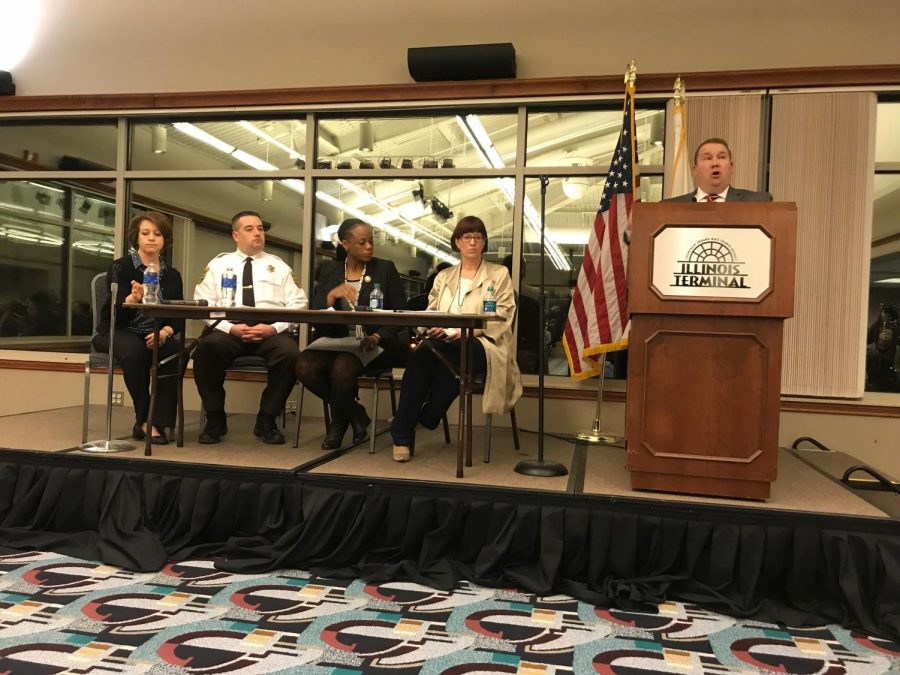Leaders explore effects of legalizing marijuana
Illinois State Sen. Scott Bennett (far right) introduces the legislative panel during a town hall meeting “C-U Talks Marijuana Legalization” on Feb. 18. The panel is comprised of (left to right) Champaign County State’s Attorney Julia Rietz, Champaign County Sheriff Dustin Heuerman, State Rep. Carol Ammons and Illinois State Sen. Heather Steans. The panel took questions and addressed concerns from the audience at the prospect of recreational marijuana legalization in Illinois.
February 25, 2019
While medical marijuana has been legal in Illinois since 2013, the proposed bills for legalizing recreational marijuana use has been in discussion in the state government.
Illinois State Rep. Carol Ammons and State Sen. Scott Bennett held a town hall meeting in Champaign to discuss the proposals on Feb. 18.
The meeting included an education and legislative panel to present information and address the concerns of the local community regarding specific bill proposals and their potential economic and societal impact. The meeting was held against the backdrop of increased talks of legalizing recreational cannabis through a proposal introduced to the Illinois General Assembly by State Sen. Heather Steans and Rep. Kelly Cassidy in early 2017.
Illinois residents ages 21 and over would be able to purchase and possess up to 30 grams of cannabis for recreational use under the program. Additionally, it would allow employers to maintain a drug-free workplace and for landlords to restrict access to marijuana.
The panel discussed equity programs for businesses applying for cultivation licenses, especially for people of color who have been disproportionately impacted by drug policies.
Get The Daily Illini in your inbox!
Ammons’ recent proposed bill, “Cannabis Legalization Equity Act,” calls for more equity provisions for marginalized communities and the establishment of community benefit funds from recreational marijuana tax revenue.
“I realized that we needed to do more to not only bring equity in the business side, but we also needed to deal with the criminal justice side,” Ammons said during the meeting.
Alondra Pulido, junior in AHS, said she believes the higher rates of minorities who are convicted for drug crimes are unfair.
“So many people are getting incarcerated and put in jail for little amounts of marijuana,” she said. “It doesn’t really serve a purpose because there’s worse things that people could be doing versus just smoking marijuana.”
Illinois is one of 33 states with a public medical marijuana program. There are two medical cannabis dispensaries in the Champaign-Urbana area.
During the meeting, education panelists spoke on a recently introduced opioid alternative program in the state, which allows some patients to apply to use medical marijuana instead of being prescribed opiates.
Major concerns raised by the public in regard to the proposed bills in addition to equity programs included road safety, the length of time the THC stays in the body and marijuana usage among juveniles.
Champaign County State’s Attorney Julia Rietz said during the legislative panel prosecution of cannabis is not a major issue in the county, with only five out of the 198 people in custody for cannabis possession or delivery. Instead, there is a greater focus on the prosecution of cocaine and heroin.
Rietz also raised concern over the nearly 20 percent increase of urine testing positive for marijuana among juveniles on probation in Champaign county from 2015 to 2018.
“We have to be cognizant of that,” Rietz said during the meeting.
“We can say it’s not a gateway drug and all of those things, but it absolutely effects (juveniles’) brain cells. It absolutely affects their decision making. It absolutely affects the direction that they go in life.”
Steans, one of the lawmakers who initially introduced recreational marijuana legalization, also proposed in her bill that the tax revenue from recreational marijuana sales should go toward funding public education campaigns on the drug.
“When you give kids good information about why it’s not good for them to do things, they make those better decisions for themselves,” Steans said. “They don’t want to go and get themselves harmed or somebody else harmed in a drinking-and-driving accident or by using cannabis.”
In addressing road safety, Reitz mentioned the costly and timely process of testing for cannabis, in addition to the lack of roadside tests for cannabis in drivers and the lack of drug recognition experts.
These experts are specially trained law enforcement officers who can conduct field tests for detecting various drugs.
“In Illinois, there are 50 certified drug recognition expert law enforcement officers for the entire state,” Reitz said. “We in Champaign County have one.”







